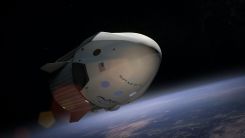Ron Jefferson

Japan Develops 'Thinking Robot' Through Physical Reservoir Computing; Learns and Moves by Artifical Neurons

First GPS-Free Device Developed with Quantum Mechanics Could Start New Era of Navigation
Study Says Neutron Star Collisions Produce More Heavy Elements Than Neutron Stars and Black Hole Merging

COVID-19 Could Damage Cells in the Blood-Brain Barrier and Increase Risk of Neurodegenerative Disorders, Study Says

Power Generator That Mimics Seaweed Movement Developed for Harvesting Static Energy from Ocean Waves

Giant Holes Formation in the Arctic Ice Sheet Shows Last Ice Area Is Less Resilient To Warming

India Experiences Most Devastating Effects From Heat-Induced by Climate Change; Country 15 Percent More Vulnerable Than 1990
SpaceX Reservation for Space Adventures Expired; Space Tourism Mission Dropped Due to Lack of Customers
Spatial Learning Impairment Observed from Deep Space Radiation-Exposed Mice, Affects Male Subjects Than Female

Dinosaur Fossil in Australia First Thought as Giant Carnivore Confirmed Today as Herbivore

Elon Musk Says SpaceX Starship Prototype Could Launch Next Month Once FAA Approves License Application
Human Brain's Size Decreased 3,000 Years Ago; Changes Linked to Ant Society

State of Antimicrobial Resistance Monitored Under Novel Approach of Wastewater DNA Detection

First Account of Social Herding in Dinosaurs Discovered from Fossils in Argentina

Orbex Reveals First Efficient and Eco-Friendly Space Rocket; A Huge Step To End Black Carbon and Climate Change
Woolly Mammoths Wiped Out by Climate Change, Humans Not To Blame

Bacteria Has the Ability to Survive Antibiotics Through Liquid Protein Droplets; Molecular Production Due to Stress

Facebook Will Get a New Name Soon; Mark Zuckerberg's Rebranding Scheme Focused on the Metaverse
Non-Invasive Novel Light Technique Accurately Measures Cranial Blood Flow for Better Diagnosis
Long-Term Greenhouse Gas Affects Retreating Glaciers Since Mid-Holocene Epoch

Hair Loss Solution: Study Says Pumpkin Seed Oils Could Thicken Hair Volume, Increase Hair Count

Tea Regimen Combined with Physical Exercise Could Improve Fitness and Weight Loss

New COVID-19 Delta Variant Subtype Confirmed in UK; AY.4.2 More Transmissible

Experts Analyzed How Nerve Cells in the Human Brain Communicate at Sites Called Synapses

Study Says Evidence For Evaluating Screening Eating Disorders Among Adults And Adolescents Is Inadequate
SpaceX's Starship SN20 Orbital Prototype Blazed Fire for the First Time During Engine Test

Individuals Not Affected by COVID-19 May Have Natural Resistance Encoded in Genes
Earth Tipped From Its Axis 84 Million Years Ago; Planet’s Layers Responsible for the Movement
Superionic Hot Ice Theorized to Maintain Magnetic Fields Present in Uranus and Neptune
Most Popular

Dark Matter Explained: What We Know, What We Don't, and How It Shapes Cosmic Structure

Ocean Acidification, Marine pH Change, and CO2 Absorption: How Coral Reef Damage and Shellfish and Plankton Impacts Threaten Marine Life

Memory and Learning: How the Brain Stores, Retrieves, and Forgets Information

Water, Carbon, and Nitrogen Cycles: How Biogeochemical Cycles Sustain Earth's Ecosystems




